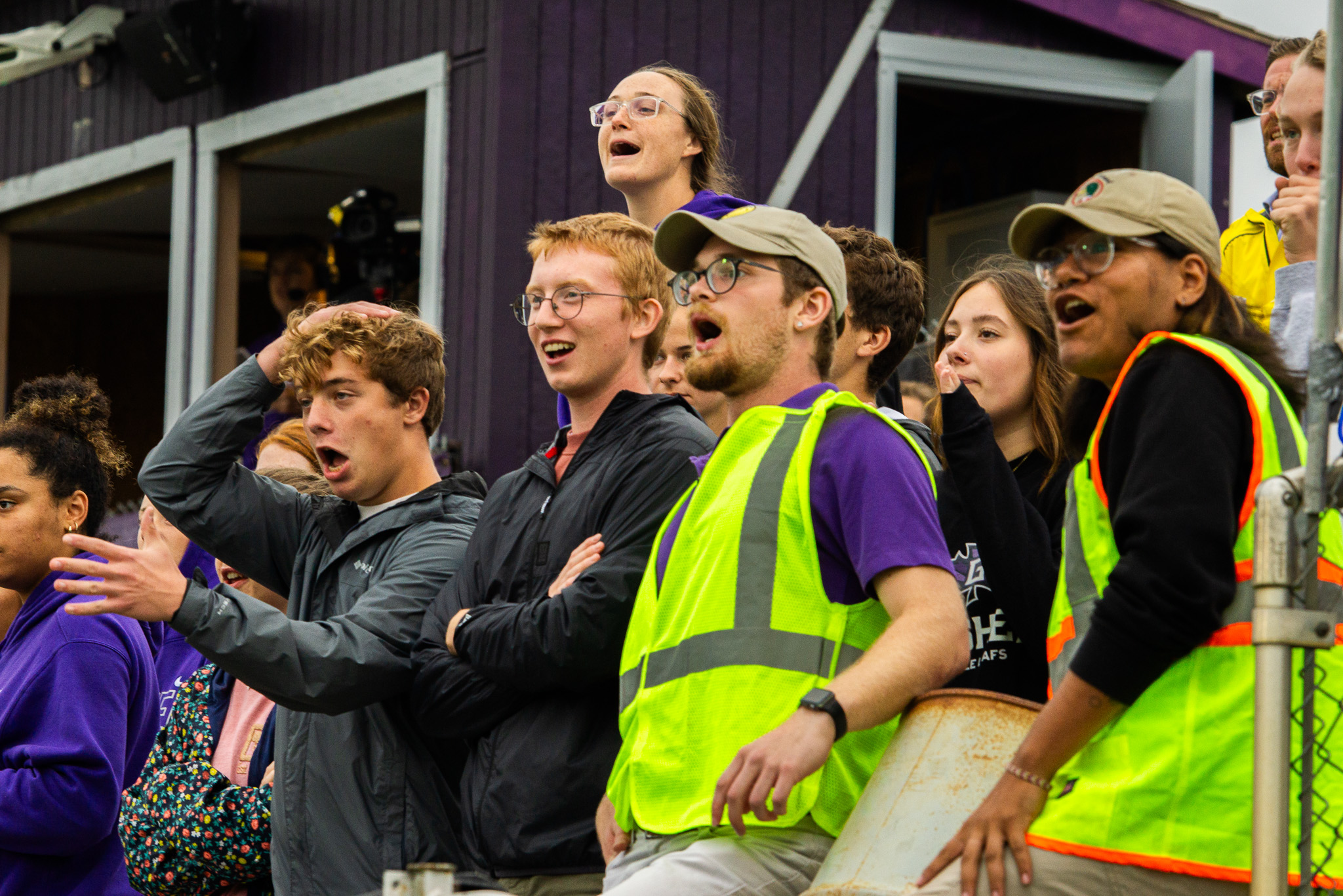Palms slam the chain link fence, a vuvuzela blares and voices are raised in a chant of “you can’t do that” as a referee awards a yellow card to an opposing player. The Goshen College student section is out in full force for women’s soccer. It ends unfortunately for the Leafs; Siena Heights gets the 2-0 win, dealing the Maple Leafs their second loss of the season. But the student section is engaged until the end, cheering on their team, making noise and willing them to put a ball in the back of the net.
The GC student section was highlighted earlier this year after a letter to the editor by Rob Brenneman, professor of criminal justice and sociology. There he recounted student actions during a game he had recently attended.“That particular day I watched a doubleheader,” said Brenneman. “It was a women’s game first and then a men’s and they were completely different. I left the men’s game because it was so uncomfortable. When one of the players they were picking on scored, it was like I wanted the earth to swallow me — this is so embarrassing.”
Brenneman left early, knowing he had to say something.
“I went home, I think I got up early the next morning and started,” said Brenneman. “I probably spent an hour and a half to two hours working on those two paragraphs, because I wanted so badly to not be misunderstood as a killjoy.”
Cormac Koop Liechty, a junior, spends a lot of time in the student section. His love of soccer sees him at as many games as he can get to.
“I think that he got a lot of stuff right, I think he raised a lot of good points,” Koop Liechty said. “I don’t entirely agree with him. I think that it’s fun to yell at players but if it’s related to the game and not talking about physical appearance and stuff like that.”
“I was there, I might have said some things that don’t reflect Goshen,” said Quincy Mussio, a senior men’s basketball player. “I was still in the thinking of being back home, big soccer like MLS games. Not everything has to be positive at a soccer game, but … I’ve been trying to rethink.”
The difference in fan behavior at men’s and women’s games is notable. There are a couple of different ideas as to why that is.
“I feel like at our school we have more respect for our women than our men,” said Gracie Stevens, a junior track and field athlete. “But that could have to do with performance and how they carry themselves outside of athletics.”
Brenneman theorized that it could have to do with societal expectations of men.
“There’s an underlying assumption that male athletes can take it, they might even deserve it,” said Brenneman. “If you’re on the field on our turf and you’re a man, we can make fun of you out loud and you just have to take it.”
Mussio agreed, citing his own personal experience playing high school and college basketball. “There’s smack talk that’s light-years different from men’s and women’s games,” said Mussio. “I can’t give a solid reason why, but I’ve noticed it. I’ve been called some heinous stuff on the court. You just can’t let it get to you, in one ear out the other.”
Koop Liechty took a different angle, attributing the difference to the quality of games GC fans have been watching.
“It’s certainly nothing about macho masculinity,” Koop Liechty said. “I think it’s a representation of the frustrations that we feel as fans trying to watch this [men’s soccer] team … there’s not a lot happening on the pitch for us to feel positive about.”
Stevens noted a specific incident from last year that highlighted the difference in what’s considered acceptable.
“At a women’s soccer game there was someone who got kicked out [by an official] for yelling ‘you’re ugly’ at one of the players,” Stevens said. “But at a men’s game when he yelled the same thing nothing happened.”
Brenneman makes it clear that he doesn’t want the student section to be quiet or even quit yelling. He even mentioned a particular occasion when he thinks the student section can, and should, express their feelings.
“I think refs deserve to hear it,” Brenneman said. “I think that’s part of the home court advantage. It’s kind of your duty to remind them that there’s a cost to questionable calls.”
“Realistically, at the end of the day, you represent the school,” said Stevens. “If you show up and act like that … one bad apple ruins the whole bunch.”




